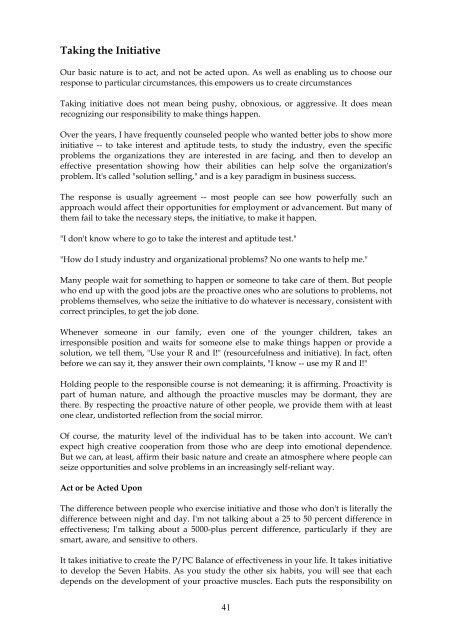Covey - The 7 habits of highly effective people
Create successful ePaper yourself
Turn your PDF publications into a flip-book with our unique Google optimized e-Paper software.
Taking the Initiative<br />
Our basic nature is to act, and not be acted upon. As well as enabling us to choose our<br />
response to particular circumstances, this empowers us to create circumstances<br />
Taking initiative does not mean being pushy, obnoxious, or aggressive. It does mean<br />
recognizing our responsibility to make things happen.<br />
Over the years, I have frequently counseled <strong>people</strong> who wanted better jobs to show more<br />
initiative -- to take interest and aptitude tests, to study the industry, even the specific<br />
problems the organizations they are interested in are facing, and then to develop an<br />
<strong>effective</strong> presentation showing how their abilities can help solve the organization's<br />
problem. It's called "solution selling," and is a key paradigm in business success.<br />
<strong>The</strong> response is usually agreement -- most <strong>people</strong> can see how powerfully such an<br />
approach would affect their opportunities for employment or advancement. But many <strong>of</strong><br />
them fail to take the necessary steps, the initiative, to make it happen.<br />
"I don't know where to go to take the interest and aptitude test."<br />
"How do I study industry and organizational problems? No one wants to help me."<br />
Many <strong>people</strong> wait for something to happen or someone to take care <strong>of</strong> them. But <strong>people</strong><br />
who end up with the good jobs are the proactive ones who are solutions to problems, not<br />
problems themselves, who seize the initiative to do whatever is necessary, consistent with<br />
correct principles, to get the job done.<br />
Whenever someone in our family, even one <strong>of</strong> the younger children, takes an<br />
irresponsible position and waits for someone else to make things happen or provide a<br />
solution, we tell them, "Use your R and I!" (resourcefulness and initiative). In fact, <strong>of</strong>ten<br />
before we can say it, they answer their own complaints, "I know -- use my R and I!"<br />
Holding <strong>people</strong> to the responsible course is not demeaning; it is affirming. Proactivity is<br />
part <strong>of</strong> human nature, and although the proactive muscles may be dormant, they are<br />
there. By respecting the proactive nature <strong>of</strong> other <strong>people</strong>, we provide them with at least<br />
one clear, undistorted reflection from the social mirror.<br />
Of course, the maturity level <strong>of</strong> the individual has to be taken into account. We can't<br />
expect high creative cooperation from those who are deep into emotional dependence.<br />
But we can, at least, affirm their basic nature and create an atmosphere where <strong>people</strong> can<br />
seize opportunities and solve problems in an increasingly self-reliant way.<br />
Act or be Acted Upon<br />
<strong>The</strong> difference between <strong>people</strong> who exercise initiative and those who don't is literally the<br />
difference between night and day. I'm not talking about a 25 to 50 percent difference in<br />
<strong>effective</strong>ness; I'm talking about a 5000-plus percent difference, particularly if they are<br />
smart, aware, and sensitive to others.<br />
It takes initiative to create the P/PC Balance <strong>of</strong> <strong>effective</strong>ness in your life. It takes initiative<br />
to develop the Seven Habits. As you study the other six <strong>habits</strong>, you will see that each<br />
depends on the development <strong>of</strong> your proactive muscles. Each puts the responsibility on<br />
41


